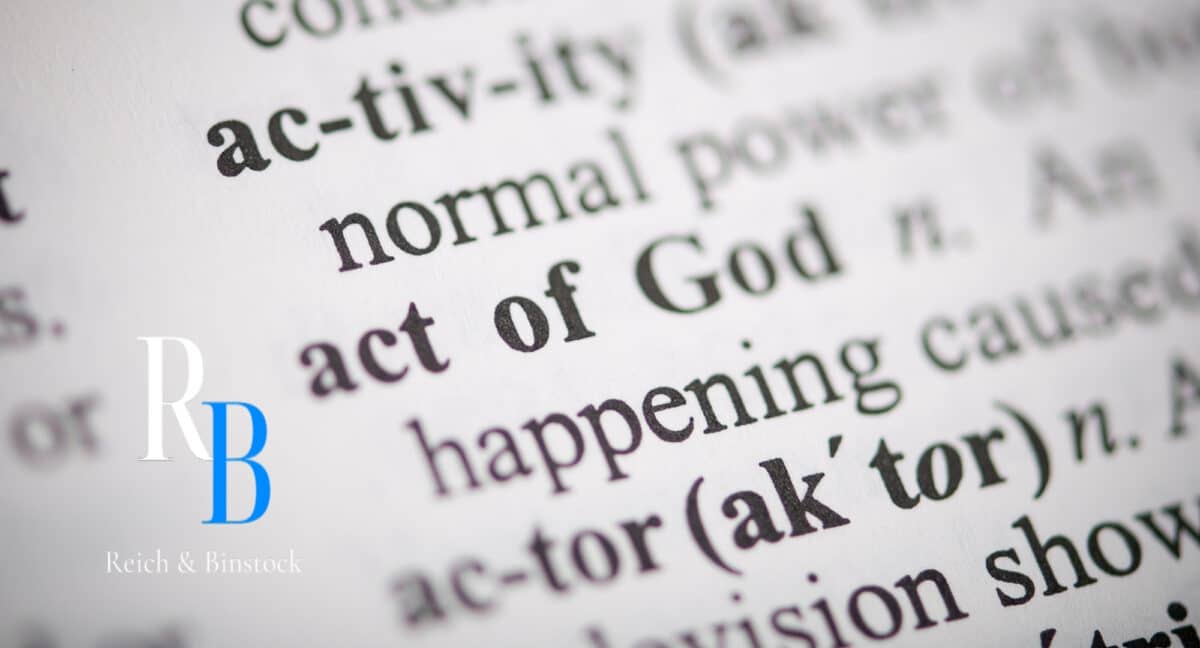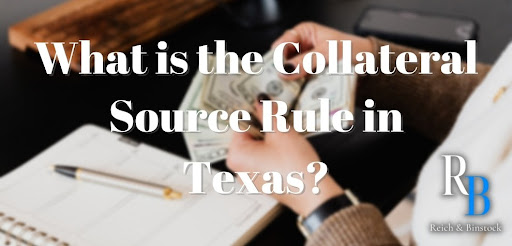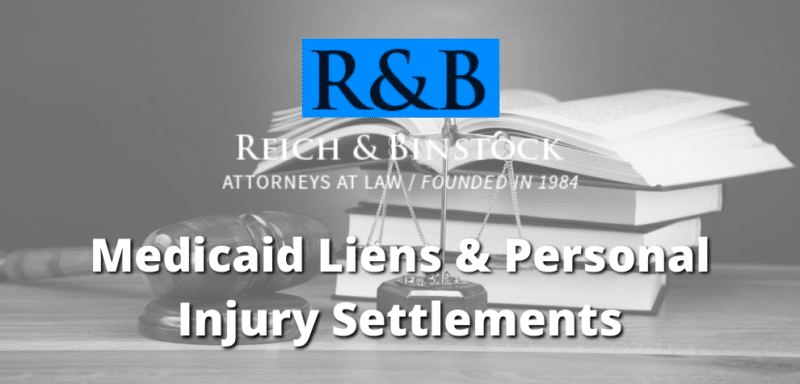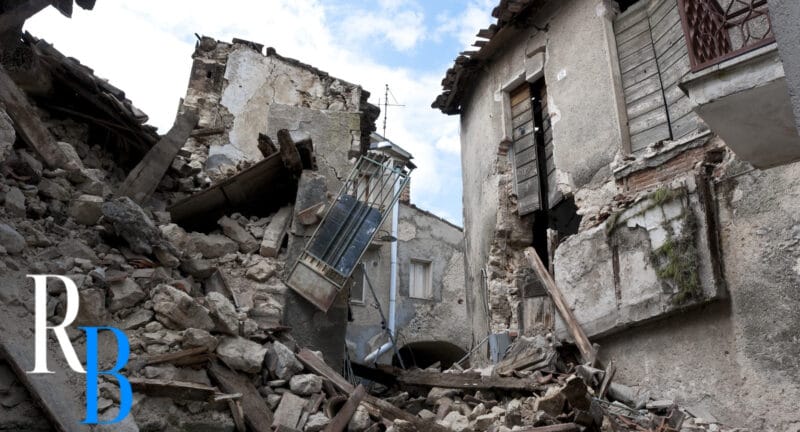ACTS OF GOD INSURANCE CLAIMS IN TEXAS
Houston Acts of God Insurance Lawyer

While filing your homeowner’s insurance claim, you may have heard the term, “Acts of God” in relation to some of the damages sustained by a natural disaster. These events are, generally, unpredictable, unpreventable, and outside of human control. They are also extremely destructive, and have the potential to change people’s lives irreversibly. Acts of God insurance claims are rare, but still very important.
When it comes to act of god insurance, your insurer probably has different definitions than other insurers. That’s why, with the help of an experienced Houston insurance claims attorney, you should examine your policy closely, and figure out how you can make the most of your claim after a devastating natural disaster.
At Reich & Binstock, we don’t just handle personal injury cases. Our Houston attorneys also handle insurance and contract claims, meaning we have you covered in multiple ways after a devastating event. We’re proud to represent both local and national clients, and we’re committed to protecting your rights against bad faith insurance practices.
If you or someone you know suffered damages because of a natural disaster and have questions about act of god insurance, you need the Houston attorneys at Reich & Binstock. To schedule your free consultation, please call 713-622-7271.
What is an Act of God?
These generally overwhelming events are the result of natural disasters. In most cases, their effects are unpredictable and unpreventable.
Acts of God are beyond human control, and thus have a very high destructive potential. Acts of God are beyond human control and thus have a very high destructive potential. Another common term is “Vis Major.” This Latin phrase basically means that natural causes inflict great damage that is neither caused by nor preventable by human beings.
Act of God Clause Example
Examples of an Act of God insurance clause include:
- Flood insurance claims,
- Earthquake insurance claims,
- Tornado insurance claims, and
- Hurricane insurance claims
Obviously, no human preparation or foresight is likely to prevent the devastation that these events cause. Some people live in areas where there is little to no risk of certain types of acts of God.
However, in Houston, we understand that certain events are unavoidable. Hurricane Harvey and Hurricane Laura caused a combined $137 billion in damages. In the next few sections, we discuss how your homeowner’s insurance policy might deal with act of God insurance.
Does Insurance Cover Acts of God Clause in Contract?
The main complication of Act of God clause in insurance claims comes from your specific plan and provider.
Most companies equate acts of god with natural disasters, but they always take into consideration the root cause of your damages.
For example, let’s say your house suffered major fire damage. If poor home wiring caused the fire, your insurance will not consider this an act of God. However, if lightning caused the fire, they will.
Keep in mind, insurance companies don’t actually use the phrase “Act of God insurance” in their policies. They describe specific natural disasters, such as flooding or earthquakes. Your particular homeowners or automobile insurance will be much more specific when it comes to Act of God insurance.
Are Acts of God Covered by Homeowners Insurance?
The connection between homeowners and Act of God insurance gets a little complicated. Technically, “Act of God” is not a category included within homeowners insurance policies.
In many cases, some Acts of God are covered, while others are not.
Most homeowners insurance policies cover wind, rain, and hail damage, as these risks are prevalent in most locations. However, most policies do not include damage from earthquakes or floods.
The best way to find out if certain types of damage are covered by your policy is to sit down with your Houston insurance claim attorney and carefully comb through your policy. An insurance lawyer will be best-equipped to find loopholes and tricks that the company will try to get past you.
However, the Acts of God insurance claims attorneys at Reich and Binstock won’t let them take advantage of you. Some policies even specify what perils you receive coverage for.
Homeowner’s Insurance Coverage
Depending on your type of homeowners insurance, you receive different types of coverage. The most common type of homeowners insurance is HO-3. This basically insures your home for all damages, except those specifically excluded. However, more limited policies, such as HO-2 or HO-1 tend to cover only perils listed within the policy, and nothing else. Your particular insurance company might even include some Acts of God in all of their policies, while excluding others in all policies.
Lastly, it is important to note that insurance companies exist to make a profit. Therefore, if they can find a source for your damage other than a natural disaster, they will certainly try. For the best chance at winning compensation against insurance companies, you need the Houston insurance claim attorneys at Reich & Binstock.
Is Act of God Covered by Car Insurance?
In general, your automobile insurance probably includes Act of God insurance. It falls under comprehensive coverage, which pays for damages to your vehicle that result from anything other than a collision.
Examples of damages covered by comprehensive coverage include fire, vandalism, and even earthquakes. While this coverage is optional, it protects you against paying large sums of money for natural disaster damages.
As with homeowners insurance, your company will most certainly try to find an alternative source of damage to your vehicle. As we stated above, they do this in order to avoid paying compensation for your damages. Let’s say a tree falls on your car during a storm. The insurance company conducts an investigation and finds that the fallen tree was actually rotten on the inside, and should have been cut down much earlier. They will use this information in an attempt to avoid paying you what you deserve.
What Kind of Insurance Policy Covers Acts of God?
Both your auto insurance and homeowner’s insurance policy could cover act of god events and natural catastrophes. In terms of car insurance, your policy will likely cover damage related to but not always limited to the following:
- Lightning strike
- Flood damage
- Damage caused by high winds
- Earthquakes
In terms of standard homeowners’ policies, your property will likely be covered for damages caused by the following:
- Hail damage
- Wind damage
- Wildfire damage
- Damage caused by fire and smoke
Unfortunately, standard home insurance policies often don’t cover everything. A policy might exclude coverage for a certain nature event if those are common where you live. Read your policy carefully to determine if your insurer has exclusions for such events. Common exclusions include earthquakes and floods. Luckily, there are a few cost-effective ways to protect your property from damages caused by flooding. One example is applying for flood insurance through the National Flood Insurance Program (NFIP). The program is managed by FEMA and helps to reduce the impact of floods in any area prone to them.
What Do Acts of God Mean for Business Property Insurance?
As with home insurance policies or an auto insurance policy, business insurance policies typically have Act of God clauses. These clauses usually exclude certain acts of God. You may need supplemental coverage if certain disasters are common in your area but not covered by insurance. Speak with a commercial property damage lawyer for more information.
What is the Difference Between Force Majeure and Act of God?
A force majeure clause comes into play when certain events prevent one party from performing their obligations within a contract. The clause basically releases the parties of their obligations to each other due to events taking place that are beyond their control.
Force majeure clauses come up often in commercial contracts. Events that trigger the force majeure clause include war, rioting, natural disasters, boycotts, or pandemics.
Acts of God, however, include only natural disasters. Essentially, a force majeure clause includes Acts of God, but Acts of God do not include all things listed in a force majeure clause. It is one way that companies avoid paying what you’re owed on the policy.
Can You Sue for an Act of God?
You can sue for an Act of God in Texas if the following apply:
- Your insurance policy specifically includes Act of God insurance, but your insurance company refuses to pay.
- You hit a deer or a tree falls on your car, but your insurance company tries to avoid paying for the damages.
You cannot sue for an Act of God in Texas if:
Most cases do not allow you to sue someone for an Act of God. This is because these events are unpredictable, and highly devastating. Nobody is responsible for them. Negligence was not the cause of the damage, and so there is nobody at fault to sue.
The main case in which people pursue lawsuits involves insurance companies refusing to pay for damages resulting from an Act of God when that person actually had coverage.
Do I Need a Texas Act of God Insurance Lawyer?
Absolutely. At first, you might think your case is simple. However, insurance companies intentionally craft complicated policies in order to confuse policyholders and get out of payments. At Reich & Binstock of Houston, we refuse to allow big insurance companies to take advantage of you during a difficult time. If you or someone you know needs an attorney who will fight for just compensation, give our office a call. Schedule your free consultation at 713-622-7271, or fill out our online intake form today.
There is never a fee unless we recover on your behalf.




















